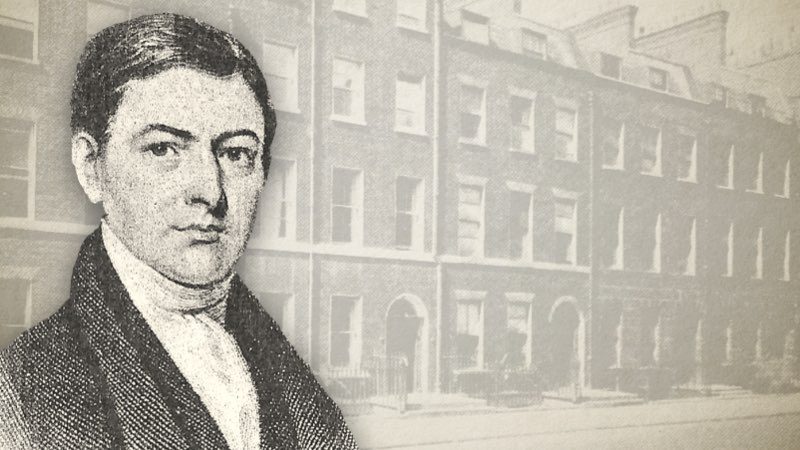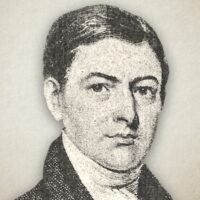
The Sword Of The Spirit
The sword is a weapon of war, to be used offensively and defensively; but it must be a poor religion that requires the power of the sword to support it. Here Popery excels in transgression. What is that religion that men are compelled to embrace by the civil power? Hypocrisy and nothing less. How can that be the free choice of a man, if the sword of power and the fear of punishment urge him to embrace religion? Is not the man so terrified into religion rather a vassal and a slave than a volunteer? Would any man in his senses call that man a volunteer who is dragged away from his home by a band of ruffians on board of a man-of-war? Does he enlist or enter afterwards? Yes, he has no choice but punishment or starvation. Satan took all mankind prisoners, but he cannot retain Christ’s captives one moment longer than the ordained time.
In the history of David, the Amalekites fell upon Ziklag where David’s family was, burned the place, and carried away the people captives. David and his men pursued the invaders, sword in hand, and rescued all as we read (1 Sam. 30:19). So our spiritual David rescues his captives from the tyranny of Satan and from the power of sin. David had a right to recover his own and so has Christ, and by the power of His sword His own captives are delivered from the hand of Him that is stronger than they. “Gird thy sword upon thy thigh, O most mighty! with Thy glory and Thy majesty.” With this weapon the Captain of our salvation who was made perfect through sufferings, combated Satan in the wilderness; He pierced that crooked serpent to the quick, and He left him for a season, and we must me the same weapon to silence Satan’s subtle reasonings and foul temptations. When devils rage, or when men persecute, we must use the Lord’s sword, and say to them all “bring all your notions and reasonings, and try them by the Word of God, as it is to be understood; let God’s Word speak for itself.” This was the course pursued by Calvin, Luther, Knox, and all the stern, unbending servants of God at the time of the glorious Reformation.
This plan is in a great measure laid aside in the present day; and reasoning and speculating upon the Scriptures just to make them speak what men please, to support their empty notion, is the too common practice. Popery cannot bear the Word of God: that “sword of the Spirit” divides asunder all systems of religion that are established by human invention; and such is Popery, Arminianism, Socinianism, and many other isms with which the world abounds. The Roman Catholics are the most audacious corrupters of the Word of God, as their writings show. They pay more respect to the sense, or rather nonsense of their Church, their councils, their creeds, and their cunning priests, than they do to God’s Holy Word. Seeing they cannot find their absurdities supported by the Scriptures, they, like the Pharisees of old, bring in and impose on the ignorant and credulous their idle dreams and foolish traditions, as if God, the author of the Scriptures, had forgotten to mention some things of vital importance to the souls of men. But the flaming sword of justice will pierce through the deceiver and the deceived, if grace prevent not. That flaming sword the Lord placed at the east of the Garden of Eden, which turneth every way to keep the way of the Tree of Life, may teach us that neither Adam, nor any of his posterity, could enter in by their own works, nor approach unto God unless His justice were satisfied. He that engaged His heart to approach unto God was His only Son; and the sword of justice pierced Him through when the Father said, “Awake, O sword, against My shepherd, against the man that is My fellow.” He is God and man, and therefore a proper mediator for poor sinners. The sword of justice will destroy that sinner who presumes to go to God without this mediator. God will not receive any man that goes to Him in any other mediator’s name. “There is one God, and one Mediator between God and men—the man Christ Jesus” (I Tim. 2:5), who is the brightness of the Father’s glory, and “the express image of His person: (Heb. 1:3). Not the Virgin Mary, nor any saint must be sought unto, for that is idolatry, and a mockery to God; and He says, “Behold My servant, look unto Me, and be ye saved.” To embrace any other doctrine is to dishonour God. Oh! how blind, how ignorant, how presumptuous are the Roman Catholics! They acknowledge Jesus Christ in words, but rob Him of His glory and honour, as do thousands called Protestants.
The saints on earth are allowed, are exhorted, are privileged to pray for each other, and to present all their petitions unto the Father in the name of Jesus, their Mediator and Intercessor; but no man taught of God would rob Christ of His glory by ascribing any power or influence to the saints either in heaven or earth.
We have no divine authority to believe that the saints in glory have any knowledge of what is passing on earth, and in the heart, of its inhabitants; that knowledge belongs to God only. When poor mortals call upon this saint or that saint in their trouble to help them, or when they call upon Jesus Christ to listen to the intercession of saints on their behalf, they might as well call upon a stock or a stone, for they will obtain nothing for their pain, but be sent empty away. “Cursed be the man that trusteth in man, and maketh flesh his arm, and whose heart departeth from the Lord” (Jer 17:5). This text is a two-edged sword in the hand of the Spirit, that cuts asunder every Agag, however fascinating he may appear; every antichristian hypothesis must fall before the power of the Spirit. When God’s word, like a sword, enters into the sinner’s heart, it lets out his malicious blood, and makes him cry like Peter’s hearers, being pricked in their hearts, “Men and brethren, what shall we do?” Such was the power that attended his preaching at that time. When God commands His word to enter, it is full of power; it commands attention, and criticises a man’s thoughts, divides a man from himself, from all his legal notions, from his fleshly forms of religion, in point of dependence, if he had any, and makes him feel that he is weak, poor, and helpless! Powerful convictions wrought by the Spirit are in due time generally attended with clear, spiritual, heart-comforting manifestations of God’s love. The sinner under the cutting operations of God’s two-edged sword may imagine he shall be cut in pieces and sent to hell as the just reward of his iniquities; but He that kills the sinner to all hope of life by his doings, means to give him a better life; for He says, “I kill and I make alive; I wound, and My hands make whole.” Paul speaks of this life most sweetly: “I through the law am dead unto the law, that I might live unto God. I am crucified with Christ, nevertheless I live; yet not I, but Christ liveth in me; and the life which I now live in the flesh, I live by the faith of the Son of God, who loved me and gave Himself for me.” The Christian is in a continual state of warfare, and he had need have his sword always at hand, like the builders of the wall round Jerusalem, because of fear in the night. The attacks Satan makes by his agents upon the outworks are not so much to be dreaded by the Christian as the desperate attacks he makes upon the inward works; he stirs rebellion in the camp, and sends forth a troop of distressing doubts and fears, carnal reasoning, and vile blasphemies; by which the poor tried soul is so perplexed that he is often driven to his wit’s end. The stronghold of Satan is the infidelity of our hearts; and from this lurking place he often throws his black suggestions to fill our poor minds with dismay and horror. If the devil can make a poor sinner think that God has done nothing for him, he not only robs the sinner of his comfort, but God of His glory and praise. We must meet all the devil’s oppositions and objections with God’s firm promises, with Christ’s fulness of grace and salvation; and when he says, we shall perish after all, we must say, No Satan, “It is Christ that died; yea, rather that is risen again.” The Sword of the Spirit in the hand of faith has done wonders; it has put to flight hosts of devils, banished thousands of distressing God-dishonouring fears, and enabled the poor sinner to shout victory while dying. “This is the victory that overcometh the world, even our faith.”
Enemies in troops assemble,
And create a horrid noise;
Oft they make my soul to tremble,
Rob and strip me of my joys.
All is dark and sore distressing
If my Captain’s out of sight;
All a curse and not a blessing,
All seems wrong and nothing right.
What a life of tribulation
Is the saved sinner’s lot!
Tried he is in every station,
Yet the Lord forsakes him not.
Does thy enemy, believer,
Labour hard to make thee fall?
Call thee hypocrite, deceiver?
Louder on Thy Captain call.
Draw out thy sword when men and devils roar,
And mark the steps of them that went before.
Henry Fowler (1779-1838) was an Independent sovereign grace preacher and hymn writer. In 1813, he assumed responsibility for a gospel work in Birmingham. He removed to London in 1819, serving as pastor of Gower Street Chapel. The original congregation met in a chapel on Conway Street, and were followers of William Hintington’s ministry. Upon Mr. Fowler’s acceptance of the call to serve as pastor, a new chapel was built on Gower Street. This chapel (now demolished) was the predecessor to the old Gower Street Memorial chapel on Shaftesbury Avenue.




